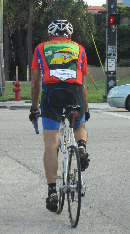 What cyclists eat and drink determines how fast and how far they can ride. What are your goals? Recreation, competitive racing, or heavy-duty triathlons? Even recreational riders should pay attention to their diet; maximize your ride and get the body you want. All athletes and exercisers need energy to function.
What cyclists eat and drink determines how fast and how far they can ride. What are your goals? Recreation, competitive racing, or heavy-duty triathlons? Even recreational riders should pay attention to their diet; maximize your ride and get the body you want. All athletes and exercisers need energy to function.
Many cyclists avoid caffeine, knowing it’s a diuretic, but here’s a surprise. During endurance exercise, the dehydrating qualities of caffeine are practically nil with small amounts of caffeine. And studies have shown that it may help the body burn fat, rather than carbohydrate reserves.
Coffee is not an ideal source of caffeine for exercisers or athletes – therefore, don’t think you can justify your Starbucks habit. We have only 1,500-3,000 calories of reserve carbs, but the body stores 70,000 fat calories at any given time, so burn, baby, burn.
Each hour of an intense bike ride will use 500-1,000 calories. Your overall protein needs will increase during exercise; supplement at 1.2-2. g protein per kilogram of body weight per day depending on your intensity and length of exercise.
For endurance events, you can increase your carbs three days prior. This maximizes the body’s glycogen stores. While you ride, you need 30-60 g of carbs for each hour beyond the first hour. An energy bar works.
Practice eating while you ride and don’t change your food choice on race day. Remember, fat can contribute as much as 75 percent of your energy demands during endurance training. Keep foods simple.
During a ride in hot weather, the body’s ability to digest becomes compromised. Liquid foods avoid this situation, and keep you speeding along without much hassle. Certain energy drinks can fill the bill, as does an Ensure protein drink, available in any drug store.
Ensure also comes in powder form; having baggies of it allows you to add it to water, drink a meal, and continue on. You can also mix fruit juice and water for a source of hydration, carbs and sugar for your blood.




